Netflix may have finally figured this anime thing out.
I had pretty high expectations for Kotarou wa Hitorigurashi, given the esteem the franchise seems to be held in. Safe to say they were more than met – this was a fantastic start (and ending – you can’t go wrong with an Itou Masumi ED). All the usual caveats about covering Netflix anime apply – I really have no idea how I’ll do so other than not binging it. There’s also the fact that this show is premiering (and was dumped in its entirety) at the end of the season rather than the beginning. But I’ll include it in the spring preview anyway, on the assumption that some folks won’t have noticed it.
 Tsumura Mami’s seinen manga has been running since 2015, and already received a live-action adaptation on TV Asahi last year. Both have been much praised by critics and fans alike, so I went into the anime on the assumption that there was probably fire with the smoke. Based on these first two episodes there certainly is – this was really smart and very funny. The feels are intense, but earned pretty honestly – for my palate things never get saccharine (bittersweet, if anything). The two best anime premieres so far in 2022 have been Netflix series, and that strikes me as pretty notable.
Tsumura Mami’s seinen manga has been running since 2015, and already received a live-action adaptation on TV Asahi last year. Both have been much praised by critics and fans alike, so I went into the anime on the assumption that there was probably fire with the smoke. Based on these first two episodes there certainly is – this was really smart and very funny. The feels are intense, but earned pretty honestly – for my palate things never get saccharine (bittersweet, if anything). The two best anime premieres so far in 2022 have been Netflix series, and that strikes me as pretty notable.
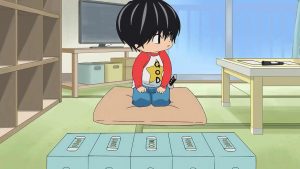 The caveat for me is that the premise – a 4 year-old boy moves into an apartment complex by himself – seems frankly absurd. I know anime and manga is obsessed with children living alone but high schoolers (even middle schoolers is a stretch) are one thing – Kotarou wouldn’t even be in kindergarten yet. So for me at least there is a certain suspension of disbelief factor, but I was past it within five minutes – the writing and performances are so sharp that I was caught up in the moment.
The caveat for me is that the premise – a 4 year-old boy moves into an apartment complex by himself – seems frankly absurd. I know anime and manga is obsessed with children living alone but high schoolers (even middle schoolers is a stretch) are one thing – Kotarou wouldn’t even be in kindergarten yet. So for me at least there is a certain suspension of disbelief factor, but I was past it within five minutes – the writing and performances are so sharp that I was caught up in the moment.
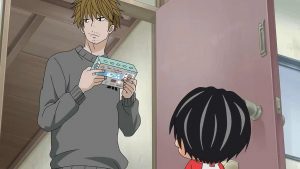 I was skeptical of Kugimiya Rie as Satou Kotarou (the live had an actual boy in the role, unsurprisingly) but she too won me over pretty quickly. Kotarou is a weird kid, speaking in a kind of formalized samurai dialect (he’s obsessed with samurai) and carrying himself with all the exaggerated dignity a toddler can muster. Kugimiya captures the inherent humor in his manner (Umu!) without making a joke out of him, which is probably the most important requirement of the performance. From the moment we meet Kotarou buying tissues (and a ¥250 sword) to give away as gifts to his new neighbors, we’re engaged in seeing what his deal is.
I was skeptical of Kugimiya Rie as Satou Kotarou (the live had an actual boy in the role, unsurprisingly) but she too won me over pretty quickly. Kotarou is a weird kid, speaking in a kind of formalized samurai dialect (he’s obsessed with samurai) and carrying himself with all the exaggerated dignity a toddler can muster. Kugimiya captures the inherent humor in his manner (Umu!) without making a joke out of him, which is probably the most important requirement of the performance. From the moment we meet Kotarou buying tissues (and a ¥250 sword) to give away as gifts to his new neighbors, we’re engaged in seeing what his deal is.
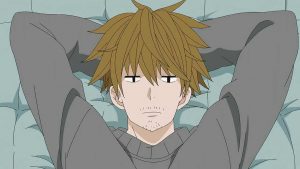 The key adult in the story is Karino Shin (Masuda Toshiki, also really good). He’s a thirty-one year-old (Masuda is also 31) struggling mangaka who rarely leaves his apartment (#202 to Kotarou’s 203) and seems rather bereft of motivation. Karino is by any conventional measure a loser, yet he passes a critical test – when he becomes aware of Kotarou’s bizarre situation, he takes an interest and behaves in a protective manner. There’s a little feint at suggesting Kotarou could be his son (Kotarou apologizing was pretty heartbreaking), but the story is much more poignant with that not being the case. The only reason for Makino to play a role is common decency – he’s unexceptional in every sense, yet he simply does the right thing.
The key adult in the story is Karino Shin (Masuda Toshiki, also really good). He’s a thirty-one year-old (Masuda is also 31) struggling mangaka who rarely leaves his apartment (#202 to Kotarou’s 203) and seems rather bereft of motivation. Karino is by any conventional measure a loser, yet he passes a critical test – when he becomes aware of Kotarou’s bizarre situation, he takes an interest and behaves in a protective manner. There’s a little feint at suggesting Kotarou could be his son (Kotarou apologizing was pretty heartbreaking), but the story is much more poignant with that not being the case. The only reason for Makino to play a role is common decency – he’s unexceptional in every sense, yet he simply does the right thing.
 The interactions between these two are really great, and Kotarou’s offbeat demeanor and speech (he declares that he speaks the way he does because the style is “trending with me right now”) is consistently a hoot. A couple of other tenants are woven into the fabric – #201’s Akitomo Mizuki (Hayami Saori), a hostess saddled with either a deadbeat boyfriend or relative. And #102’s Tamaru Isamu (Suwabe Junichi), who may or may not be a yakuza but is definitely divorced with a son who hates him, and who sees Kotarou as (unwillingly) a surrogate.
The interactions between these two are really great, and Kotarou’s offbeat demeanor and speech (he declares that he speaks the way he does because the style is “trending with me right now”) is consistently a hoot. A couple of other tenants are woven into the fabric – #201’s Akitomo Mizuki (Hayami Saori), a hostess saddled with either a deadbeat boyfriend or relative. And #102’s Tamaru Isamu (Suwabe Junichi), who may or may not be a yakuza but is definitely divorced with a son who hates him, and who sees Kotarou as (unwillingly) a surrogate.
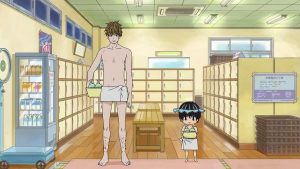 With the pieces on the board, the second episode launches into the series proper. At this point it seems as if it will be a string of connected vignettes, each a half-episode long, depicting Kotarou’s life in the apartment complex. Kotarou’s situation is the elephant in the room – we’re aware of it, the neighbors are aware of it, but no one really wants to talk about it. When you step back and think about it this is a sad and rather alarming situation, but everyone copes with that by pretending things are not so much normal, but sort of “this is just as it is”. Mostly, that means everyone (but especially Karino) trying to watch out for Kotarou without formally involving themselves.
With the pieces on the board, the second episode launches into the series proper. At this point it seems as if it will be a string of connected vignettes, each a half-episode long, depicting Kotarou’s life in the apartment complex. Kotarou’s situation is the elephant in the room – we’re aware of it, the neighbors are aware of it, but no one really wants to talk about it. When you step back and think about it this is a sad and rather alarming situation, but everyone copes with that by pretending things are not so much normal, but sort of “this is just as it is”. Mostly, that means everyone (but especially Karino) trying to watch out for Kotarou without formally involving themselves.
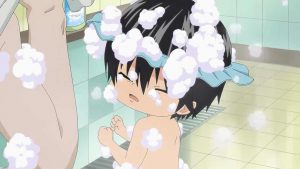 Tamaru is the most problematic of the trio, because he condescends to Kotarou (which smart kids like him pretty much universally hate) and doesn’t respect his personal space. Kotarou’s problems are both typical of a 4 year-old and unique to his situation. His favorite anime “Tonosaman” (that’s where he gets the speech patterns) is ending. He has trouble sleeping alone at night, but doesn’t want to admit that to Karino. Most obviously, he craves close human contact – to the point where he pays people 10 Yen to watch him do his Tonosaman impression on the street. He also freaks out when he has to go without a bath for a day (the sento is closed, and the apartments have no baths), finally resorting to bathing in the sink.
Tamaru is the most problematic of the trio, because he condescends to Kotarou (which smart kids like him pretty much universally hate) and doesn’t respect his personal space. Kotarou’s problems are both typical of a 4 year-old and unique to his situation. His favorite anime “Tonosaman” (that’s where he gets the speech patterns) is ending. He has trouble sleeping alone at night, but doesn’t want to admit that to Karino. Most obviously, he craves close human contact – to the point where he pays people 10 Yen to watch him do his Tonosaman impression on the street. He also freaks out when he has to go without a bath for a day (the sento is closed, and the apartments have no baths), finally resorting to bathing in the sink.
 These mini-episodes, culminating in Kotarou’s first day of kindergarten, are an intriguing mix of quirky humor and genuine gut-wrenching sadness. The juxtapose the mundane and the bizarre masterfully, and each one is thoroughly involving. Mizuki slips into a more direct role in Kotarou’s life, inviting him for a sleepover (he doesn’t get any sleep, but he does enjoy it). Kotarou dodges the issue of being alone at the entrance ceremony by telling his seatmate that his parents are ninjas, and sets about the task of creating believable bentos by asking ideas from the customers at the konbini (who he returns to thank the next day) – where the clerk too finds herself informally looking after him.
These mini-episodes, culminating in Kotarou’s first day of kindergarten, are an intriguing mix of quirky humor and genuine gut-wrenching sadness. The juxtapose the mundane and the bizarre masterfully, and each one is thoroughly involving. Mizuki slips into a more direct role in Kotarou’s life, inviting him for a sleepover (he doesn’t get any sleep, but he does enjoy it). Kotarou dodges the issue of being alone at the entrance ceremony by telling his seatmate that his parents are ninjas, and sets about the task of creating believable bentos by asking ideas from the customers at the konbini (who he returns to thank the next day) – where the clerk too finds herself informally looking after him.
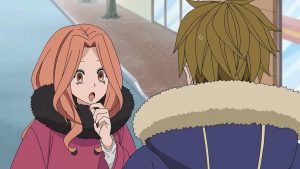 It’s a strange mix, all this, but it totally works. Kotarou is irresistible, weird in an adorable way, mature for his age but only enough to make his situation that more more poignant. What’s clear is that he’s filling a need in the lives of these people, especially Shin (the complex probably doesn’t even accept cats). In lesser hands this could so easily be maudlin, but it never crosses that line – with a situation like this good storytelling lets the pathos sell itself rather than overselling it. Call it a winter series or spring, whatever you like, but Kotarou Lives Alone is another piece of evidence that Netflix is getting better at anime all the time. And that’s certainly a hopeful sign for a medium that creatively needs all the help it can get.
It’s a strange mix, all this, but it totally works. Kotarou is irresistible, weird in an adorable way, mature for his age but only enough to make his situation that more more poignant. What’s clear is that he’s filling a need in the lives of these people, especially Shin (the complex probably doesn’t even accept cats). In lesser hands this could so easily be maudlin, but it never crosses that line – with a situation like this good storytelling lets the pathos sell itself rather than overselling it. Call it a winter series or spring, whatever you like, but Kotarou Lives Alone is another piece of evidence that Netflix is getting better at anime all the time. And that’s certainly a hopeful sign for a medium that creatively needs all the help it can get.


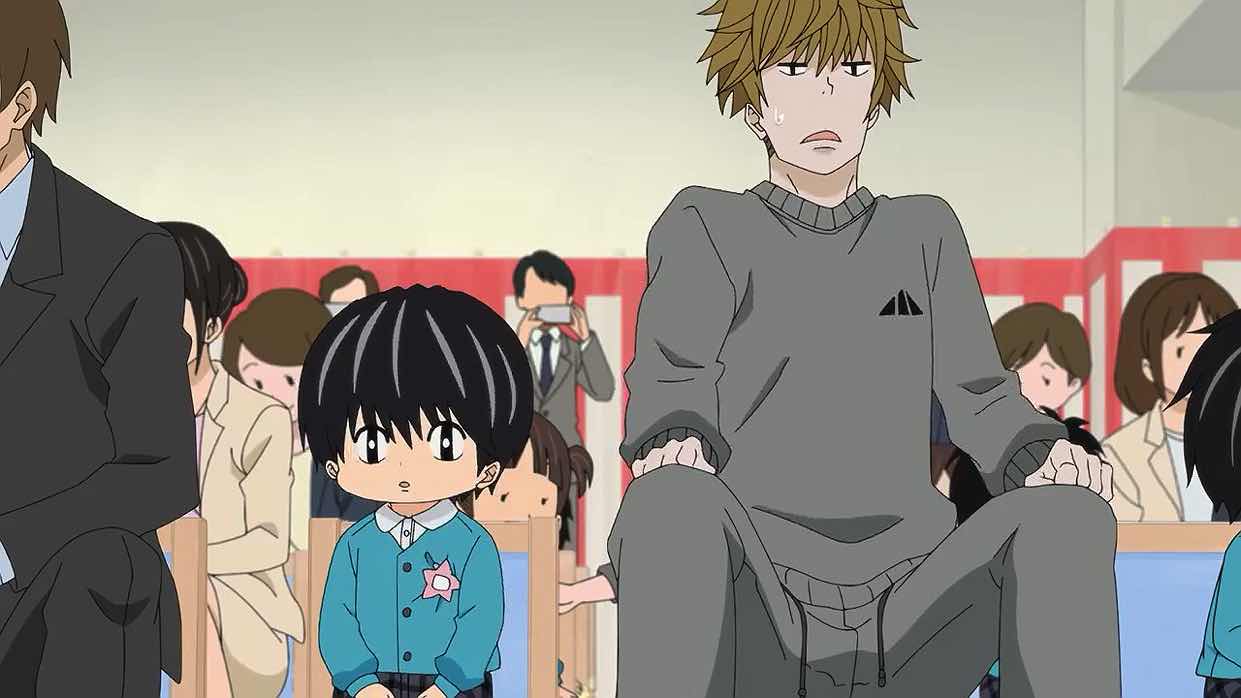


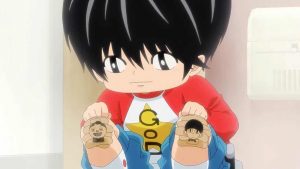
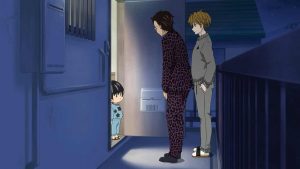
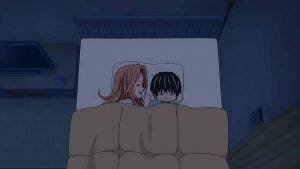
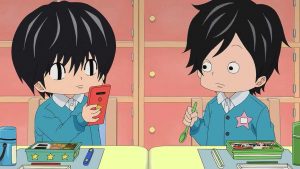


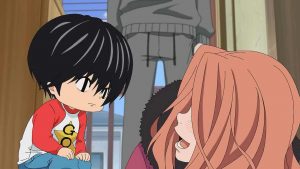
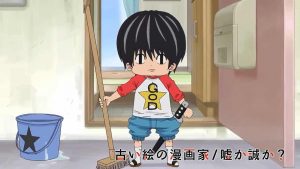
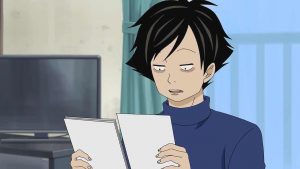
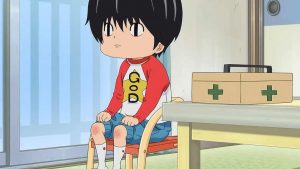
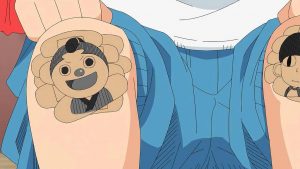

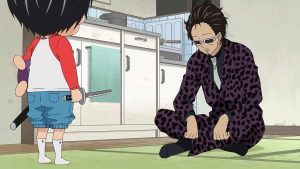
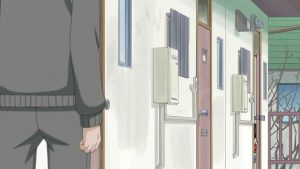
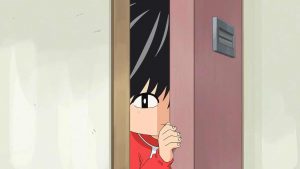

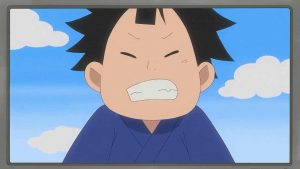
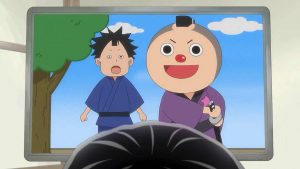
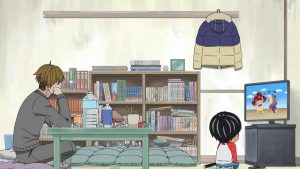
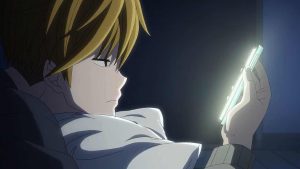
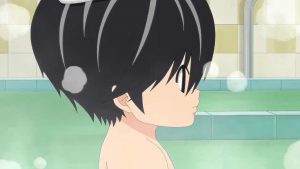
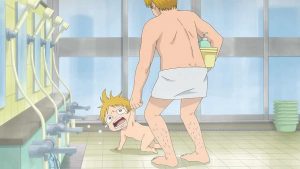
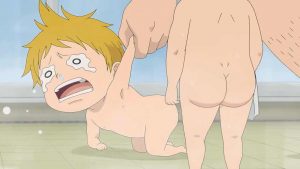
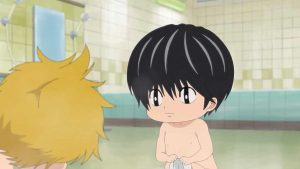
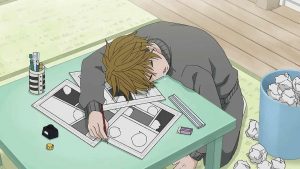

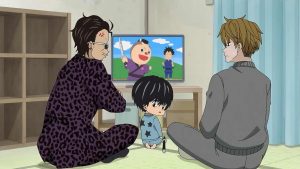
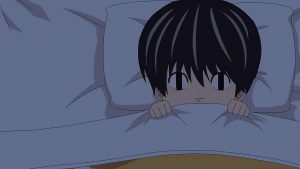
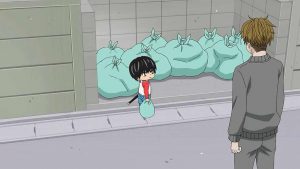

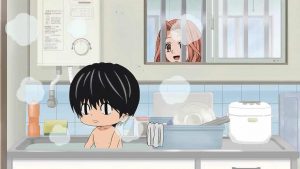
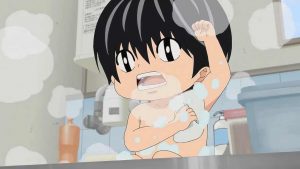
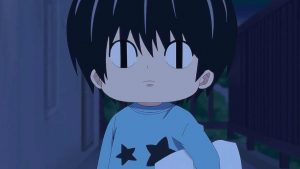
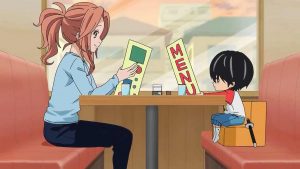
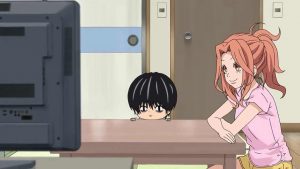
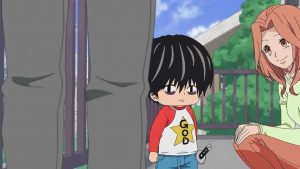
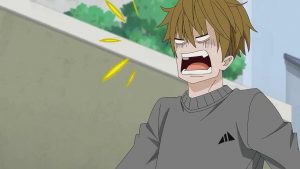
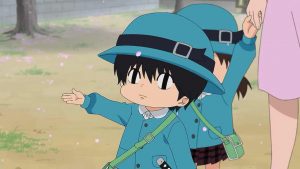
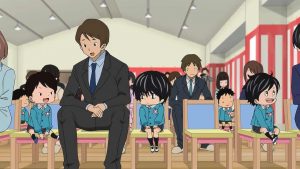
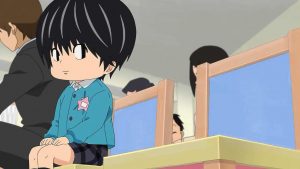

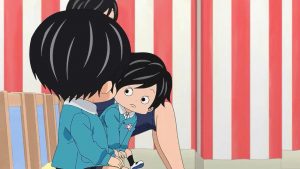
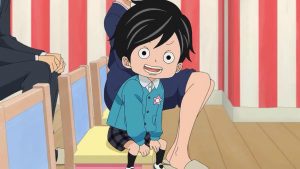
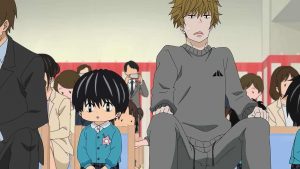
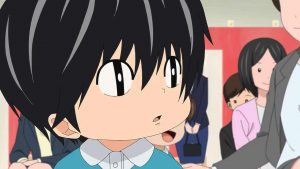
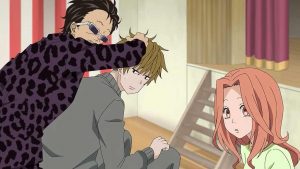
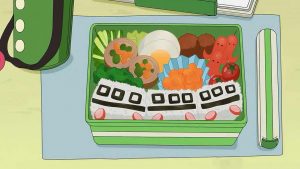
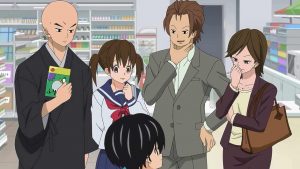

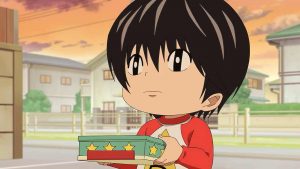
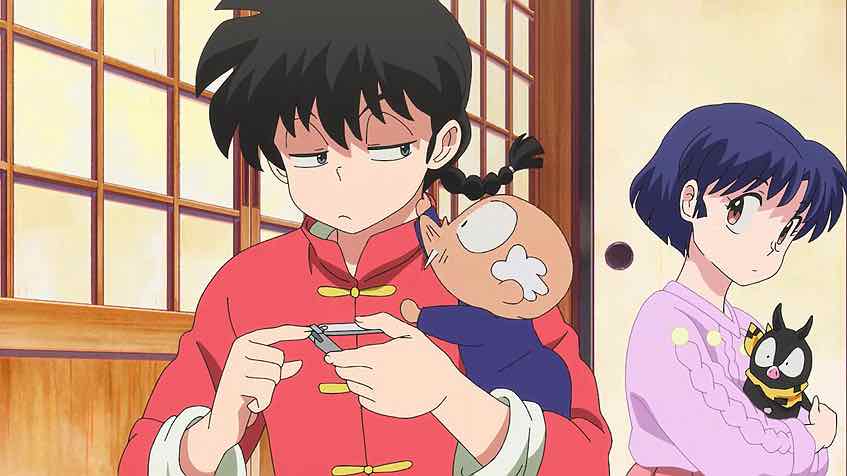
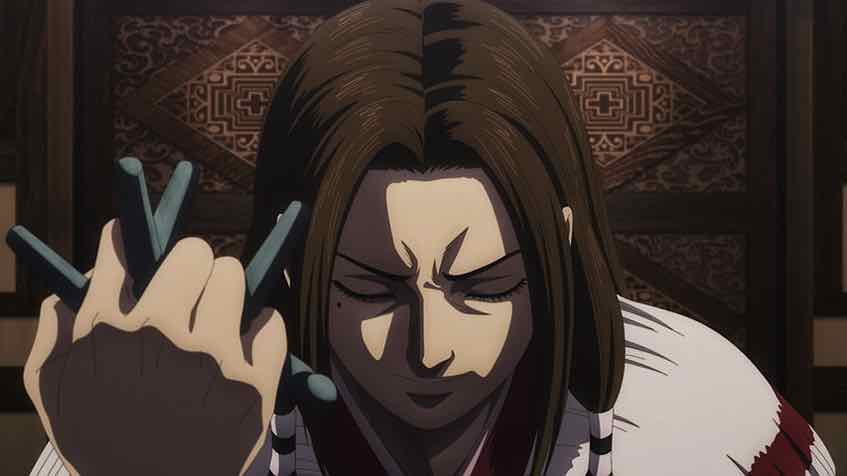
geha714
March 15, 2022 at 12:25 amI finished this weekend and I was quite surprised. I was wondering how they going to handle the odd premise. But the series just didn’t use it well, but went to directions I wasn’t expected with good results. The format of three vignettes inside an episode swings sometimes too abruptly between comedy and drama, but the charm of the characters and the way the story addresses some tough issues compensate for it. Kotaro is both adorable and engaging as a main character. Kudos to Rie Kugimiya for her great performance. The rest of the cast was good, especially Toshiki Masuda.
The animation was alright for what the show was aiming for, but one part of me wonders what a studio like Doga Kobo would have done instead. Still, this was quite good.
Litho
March 15, 2022 at 1:37 amI’m halfway through this. Unexpectedly (for me) heavy in places. Didn’t know it was based on a manga. Judging from abrupt changes in tone within episodes, I assume the manga chapters are short ones? Overall, quite a decent watch. I’m alternating between this and the current season of Disenchantment for my daily dinner time viewing.
Red
March 15, 2022 at 8:14 pmThanks for the review and the high praise you put on this show, it is well placed and I wouldn’t have checked this otherwise. Will be waiting for the episodes review since I just finished this series.
Guardian Enzo
March 15, 2022 at 9:39 pmYou’re welcome! I’m feeling like two episodes a week maybe (I like to make shows last, not binge them) but not really sure yet.
James
March 20, 2022 at 5:13 amI’m crying in the club
Aureus Adler
March 25, 2022 at 10:58 pmI accidently watched the show. ( yes accidently, just 5 eps.) It had a very high rating from both critics & fans, so I got curious as i was searching for good shows.
I am definately not a person who has interest in anime & manga but I do love good movies & shows irrespective of the format or medium. My all time fav anime is Paprika by Satoshi Kon, the great visuals & music still feel brand new everytime I watch it.
Kotarou wa Hitorigurashi is just as good if not better as Paprika (2006) to me, the simplistic visuals allow you to grasp the deeper meaning at each & every turn. I feel like the food critic in the movie Ratatouille (2007) who gets transported to distant safe memory of his happiest day with the taste of just a spoonful of the special dish prepared.
Its an awful shame such a great show/anime/manga has no name recognition as yet in my world, the story telling is really well formulated.
Today cheap, regurgitable slop gets pushed with political ideology to people & people are happy with that. Because they have lost purpose in life due to apathy. Lying flat, Mgtow etc are all symptoms of that society. A society profits of misery & apathy.
But Kotarou reminds us of what we’ve collectively forgotten.
This show is not unique, we all have a hobby or a fav childhood tv show that elicits simillar emotions.
Kotarou wa hitorigurashi taps right into that.
(Your review was one of the best praises of show, hence I had to write a comment to thank you.)
Guardian Enzo
March 25, 2022 at 11:14 pmWell, you’re very welcome – that was a very heartfelt and powerful comment.
That’s certainly high praise, any time Satoshi Kon is mentioned.If it’s any consolation, this franchise does at least seem to have a real following in Japan – it’s received both a live-action and an anime, after all.